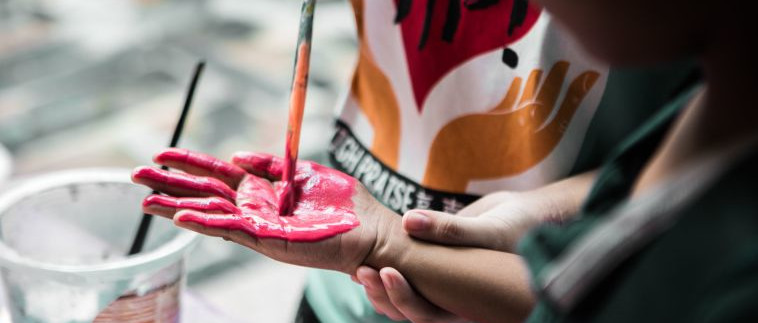Development Cooperation

An interview with Franca Palmy and Anita Baumgartner, CO-Heads, Partnerships and Philanthropy at Helvetas.
Development cooperation and humanitarian aid are important fields of philanthropy. The focus is on sustainable «help for self-help». Franca Palmy and Anita Baumgartner jointly answer questions on the topic of development cooperation.
How important is philanthropy for development cooperation in Switzerland?
Who are the most important actors in development cooperation and humanitarian aid?
The most important actors are the people in the developing countries themselves. It must be about supporting them to follow their own development path, to identify their priorities and needs, and to claim their rights vis-à-vis their government – e.g., the right to water or education. Local civil society organizations in the respective countries play an important role in development. They perform important tasks for the population and also represent them to the authorities. Often, however, they themselves need organizational and professional reinforcement so that they can perform this role well.
We must not forget local governments, which are fundamentally responsible for providing public services such as education, health or infrastructure. And also important is the private sector, which is significant for economic development, jobs, income and supply. International aid organizations, private foundations and government development agencies can help with money and expert advice. Private aid organizations have the advantage of flexibility and proximity to the people. Government institutions, on the other hand, have more budget and can tackle larger, longer-term and more complex projects, such as education reform.
Are there differences between humanitarian aid and development cooperation?
The approaches are different, although there are approaches from both sides. In classical humanitarian aid, to put it simply, support tends to be provided from the outside in the event of acute problems such as disasters or conflict situations. For example, one builds a water supply when there is no water for displaced people. In development cooperation, you look at the whole system and help the communities to take their responsibility: to make a tender, to raise money, to hire a company, to supervise the construction and to set up a maintenance system.
How well does philanthropy work in development cooperation?
The addition of private aid to public cooperation and direct support of local initiatives are highly appreciated. The diversity of different approaches and ideas can also be fruitful. However, it remains a challenge for grant giving foundations and project owners to come together for the right projects. It can become problematic when donors want to implement their own ideas without regard to local conditions or priorities, or when their aid reinforces dependency because it «distributes aid» but does not promote self-help. It always becomes difficult for project owners when funders are not willing to pay for costs related to knowledge management, security, compliance, research and development, or marketing. Because no organization today can do good work and remain healthy and innovative without these areas.
And what are the biggest challenges in development cooperation?
The interaction of all actors must work better for the benefit of the poorest. This is a challenge because state structures are often weak, education and know-how or even economic actors are lacking. There are huge expectations for development cooperation. Some people think that development cooperation solves all problems, even those that have other causes, such as unfair trade relations. Moreover, despite public opinion to the contrary, overall funding is still modest. Around 500 francs per capita have been spent since 1960. It should be clear that this will not lift all people out of poverty. It would still need much more.
The American economist Jeffrey Sachs once said in an interview: «You give a little help, but not enough to really solve the problem. If you receive a drug in an insufficient dose and it doesn’t work, you probably conclude that it’s a bad drug. But actually, you would have to conclude that it was not given in sufficient quantity.» And then, indisputably, there are still projects that run counter to the actual goals of development cooperation. For example, by serving the interests of the North more, or by increasing dependencies and injustices.
What do you personally donate to and what is your motivation?
Franca Palmy: Apart from «my» organization, I support two other organizations that are active in other areas that are important to me. We are incredibly privileged here in Switzerland, in many ways. We know that very many people elsewhere lack basic things that we take for granted. Knowing that and doing nothing to make the playing field more equitable for everyone doesn’t work for me. Anita Baumgartner: I also donate to Helvetas and three other organizations that deal with environmental protection and human rights, as well as to a Zurich hospice for the dying that very lovingly accompanied a friend of mine to her death.
Are you involved in volunteer work?
Franca Palmy: Yes, frequently. I am currently privately involved in the Corporate Responsibility Initiative. Anita Baumgartner: In addition to family time with two children and my professional commitments, I currently have too little time to do volunteer work. As soon as there is a little more air again, I would like to get involved in a foundation board.

ABOUT THE AUTHORS
Franca Palmy and Anita Baumgartner
Franca Palmy: After studying history and political science at the University of Zurich, Franca Palmy worked for eight years in the field of refugees and migration, first at the Canton of Zurich, then as a country analyst at the Swiss Confederation. She later moved to the private sector and worked for several years as a communications consultant before joining Helvetas in 2012.
Anita Baumgartner was originally a journalist and editor before moving into humanitarian aid as an ICRC delegate in 2000. She has been matching foundations and philanthropists with the right projects since 2003, first at Médecins Sans Frontières (MSF) and since 2010 at Helvetas.